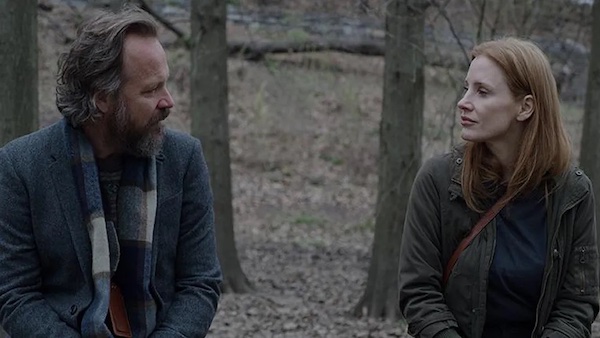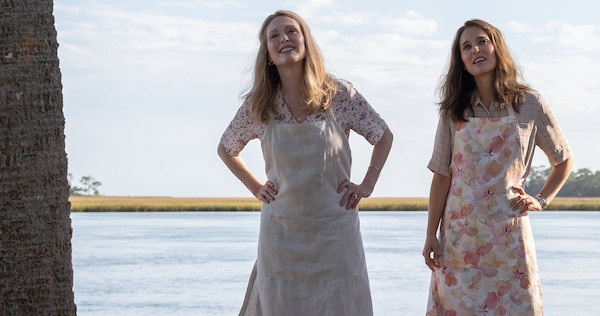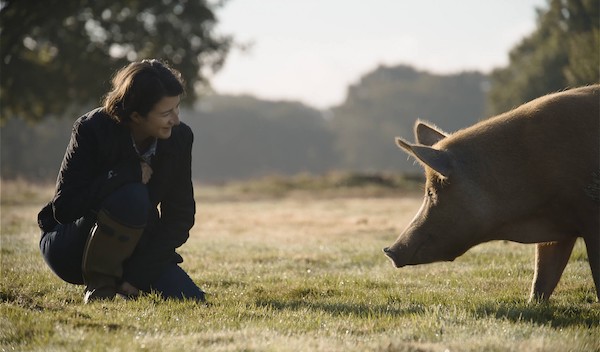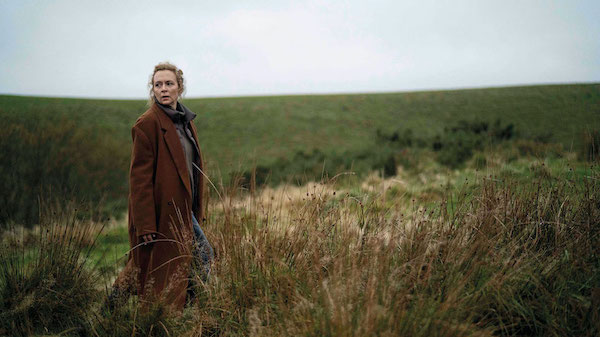London Film Festival, Dispatch #2: My Festival Favorites
By Peg Aloi
It’s hard to pick favorites, but here are my top films from this year’s London Film Festival.
This year’s London Film Festival had a very high quality slate of films. I skipped some “big” titles because of the shortage of seats at some press screenings (this happened to me twice with two showings of the same film). I will be able to see some of them soon enough in the US. It’s a great year for films made in 35mm, so go see things in theaters when you can (even better if you can see them projected in 35mm, a rare opportunity these days). Speaking of seeing things in theaters, yes, I wore a mask for all the screenings I attended: I was one of a very small percentage of the crowd doing so. I heard plenty of people coughing (myself among them because I had a cold this week), so here’s your friendly reminder that Covid is still pervasive, cold and flu season is imminent, and cinema isn’t worth getting sick over. Still, cinema provides a thrilling and occasionally soothing distraction in a world that’s becoming more insane by the day. It’s hard to pick favorites, but my top films from this year’s festival were Memory, May December, Wilding, Eileen, and Unmoored.

Peter Sarsgaard and Jessica Chastain in Memory. Photo: Venice Film Festival
Memory, written and directed by Michel Franco (After Lucia, Sundown) stars Jessica Chastain as Sylvia, a single mom who shares a small NYC apartment with her teenage daughter Sara (Elsie Fisher of Eighth Grade and Castle Rock). Sylvia works at an adult day care for people with developmental disabilities; she is a recovering alcoholic and doesn’t have much of a social life. She comes from a wealthy family, from whom she is estranged. A co-worker urges Sylvia to attend a high school reunion at a local bar, and Saul (Peter Sarsgaard) comes up and sits silently next to her. Sylvia seems to recognize him and decides to leave. He follows her home, and stays outside until the next morning. Sylvia realizes the man needs help; she finds a tag on Saul that says he has dementia. She calls his brother Isaac (Josh Charles), who collects Saul and apologizes for the inconvenience.
What follows is a rather intricate trajectory that begins with a troubling look back at the past: Sylvia’s faulty recollection of traumatic events from middle school are complicated by Saul’s frequent lapses of memory. Both Sylvia and Saul must grapple with manipulative family dynamics: Sylvia has difficulties with her self-centered mother (Jessica Harper supplies a great cameo); sister Olivia (a complex, powerful performance from Merritt Wever) is supportive, but wary of acknowledging Sylvia’s troubled past. Some of the narrative feels implausible at times, but an excellent cast holds this somewhat dark but tender and redemptive story together.

Natalie Portman (right), and Julianne Moore in May December. Photograph: François Duhamel
I’ll be writing a longer review of May December soon, but it’s worth saying that this film marks both a stylistic departure and a return to form for Todd Haynes, who branched out from his melodramatic roots with Dark Waters (based on an environmental lawyer’s landmark case) and now tackles a real life story that has long been fodder for the tabloids. The film is based on the life of Seattle school teacher Mary Kay Letourneau (played by frequent Haynes collaborator Julianne Moore), who was imprisoned after she was discovered having a sexual relationship with a 13-year-old student. The screenplay posits an event that turns a 20-year marriage upside down. Natalie Portman plays a popular Hollywood actress who is starring in a movie about the famous couple (named Gracie and Joe in the screenplay by Samy Burch). She asks to meet the family so she can study Gracie for what may be a career-defining role. This unlikely scenario is rendered with wildly shifting tonal complexity, from soap opera to black comedy to intense psychological thriller. And there are searing performances from Moore, Portman, and Riverdale’s Charles Melton as Joe.
My colleague Peter Keough will be reviewing Eileen, a fabulous new thriller starring Thomasin McKenzie and Anne Hathaway, but I wanted to quickly note that the period stylings on this film, directed by William Oldroyd (Lady Macbeth), are stunning, sensuous, and unforgettable. The gorgeous cinematography by Ari Wegner (The Power of the Dog), and scrupulously fine costume design by Olga Mill (Hereditary and First Reformed) pay clear homage to the color-fed symbolism of Todd Haynes’s Carol.

A scene from Wilding. Photo courtesy of HIFF
I saw Eileen the same day I saw Wilding, a documentary I “settled” for after being shut out of the morning screening of May December. Boy, did I luck out seeing this beautiful, fascinating, moving documentary on the big screen. Wilding, based on the book by Isabella Tree, tells the story of the Knepp Estate, a large rural farming estate in southeast England ,where a compelling experiment has been taking place for the last two decades. The owners of the 350-acre property, Charlie Knepp and wife Isabella, decided to radically change the way the property had been handled over the course of its 300-year history. They let nature take over. Reintroducing ancient species of cattle, pigs, and horses, they let the grounds, decimated by decades of chemical-heavy industrial farming, return to its origins. They encouraged the land’s rich natural diversity, which fed the soil and nurtured the complex ecosystem of insects, birds, flora, and fauna, many of which were approaching near-extinction.
The ambitious project was not without obstacles, including angry resistance from neighboring farms. But the resulting changes, chronicled with heart-stopping footage, have been nothing short of miraculous and inspirational, including the return of species not seen in the area in over 600 years. Narrated by Isabella Tree, this astonishingly moving film is a balm for these worrying times, as we navigate the way forward on a planet in peril.

A scene from Unmoored. Photo: British Film Institute
Unmoored is a tense psychological thriller by Swedish director Caroline Ingvarsson. A well-known television presenter, Maria (Mirja Turestedt), is going through difficult times as she navigates the scandal generated by accusations of sexual impropriety against her husband Magnus (Thomas Gabrielsson), a prominent author. The situation lays bare tensions in their marriage, including Maria’s hours of thankless work editing her husband’s books. En route to a holiday in Morocco, an angry confrontation with her husband leaves Maria desperate to get away on her own. She drives to England, booking a stay in a remote cottage on the moors. Alone, she recalls the events that precipitated her escape, feeding her paranoia and untethering her from reality. There’s a touch of folk horror sensibility here; Maria’s spiraling mental state is affected by the haunting natural surroundings. A strong cast, including Kris Hitchen as Mark, a kind local man who befriends Maria, anchors this subtle story in gritty, plausible emotion.
My next and last dispatch will feature short reviews of Shoshana, Hoard, Stopmotion, Starve Acre, and Last Summer.
Peg Aloi is a former film critic for the Boston Phoenix and member of the Boston Society of Film Critics, the Critics Choice Awards, and the Alliance for Women Film Journalists. She taught film studies in Boston for over a decade. She writes on film, TV, and culture for web publications like Time, Vice, Polygon, Bustle, Mic, Orlando Weekly, and Bloody Disgusting. Her blog “The Witching Hour” can be found on substack.
Tagged: Caroline Ingvarsson, Jessica Chastain, Liam Neeson, May December, Peter Sarsgaard, Scot Williams, Unmoored, memory
